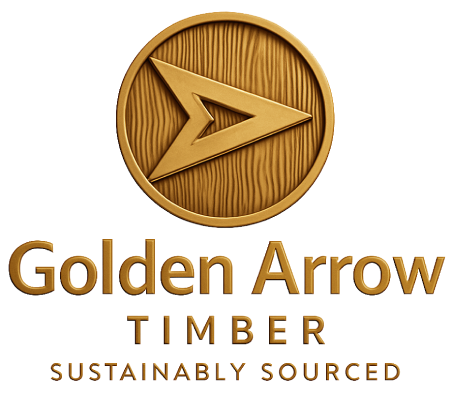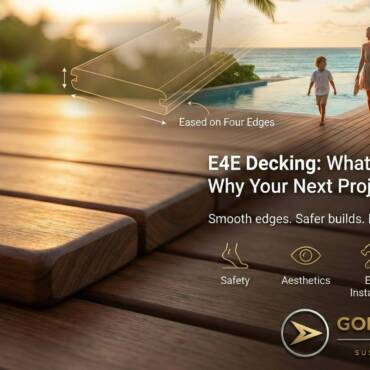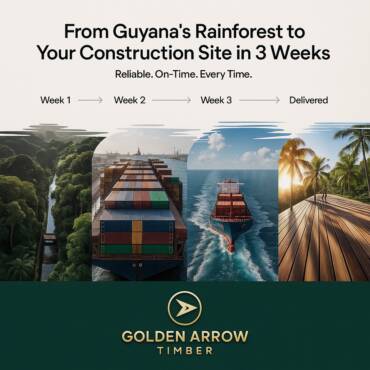Comprehensive Buyer’s Guide to Tropical Marine Woods: Durability, Sustainability & Market Shifts
Tropical hardwoods like Greenheart, Ipe, Mora, Morabukea, and Black Kakaralli are the backbone of marine and outdoor construction. Their unmatched strength, longevity, and natural resilience make them the preferred choice for piers, docks, bridges, and premium flooring.
But for procurement managers and developers in the USA and Caribbean, new 50% tariffs on Brazilian timber under the Trump administration have disrupted supply chains and inflated costs.
This guide compares each wood’s attributes, sustainability profile, and cost-effectiveness—plus a side-by-side table for quick reference. Most importantly, it shows why Guyana-sourced timber from Golden Arrow Timber is strategically positioned to help you navigate these challenges.
Unique Attributes: What Sets These Woods Apart
- Greenheart (Guyana/Suriname) – Extreme density and natural resistance to marine borers, fungi, and termites. Lasts 75–100 years untreated. Perfect for marine pilings, docks, bridges, and boatbuilding.
- Ipe (Brazil) – Known as Brazilian Walnut. Fire-resistant, UV- and traffic-durable. Common in luxury decking and boardwalks. Supply, however, is under pressure due to overharvesting.
- Mora (Guyana, Suriname, Venezuela, Brazil) – Interlocking grain resists warping and abrasion. Used in heavy construction, flooring, and marine wharves.
- Morabukea (Guyana/Suriname) – Shock-absorbent and stable in wet conditions. Cost-effective choice for structural timbers, pilings, and bridges.
- Black Kakaralli (Guyana) – Strong, rot-resistant, and budget-friendly Greenheart alternative. Ideal for marine works, pilings, and infrastructure projects.
These woods outperform temperate options like pine when it comes to durability in harsh coastal environments.
Sustainability: Why Responsible Sourcing Matters
- Certification: Guyana’s Greenheart and Black Kakaralli often carry FSC certification, unlike many Brazilian Ipe supplies.
- Biodiversity: Selective logging in Guyana preserves habitats, while poor practices in the Amazon often raise environmental concerns.
- Grading & Standards: ASTM and NHLA standards ensure strength and appearance. Most species here meet Class 1 (very durable) under EN 350.
- Ethics: Guyana promotes the use of lesser-known species (like Black Kakaralli) to reduce pressure on overharvested timbers.
Sustainability is no longer optional—it’s a procurement requirement.
Comparison Table: Specs & Applications
| Wood Type | Density (kg/m³) | Janka Hardness (lbf) | Durability Class | Key Qualities | Typical Uses |
|---|---|---|---|---|---|
| Greenheart | 970–1,040 | 2,350–3,040 | 1 (Very Durable) | Resists marine borers, extreme density, low shrinkage | Pilings, docks, bridges, boatbuilding |
| Ipe | 1,050–1,200 | 3,510–3,684 | 1 (Very Durable) | Fire-resistant, stable, rot-proof | Decking, flooring, furniture, boardwalks |
| Mora | 950–1,000 | 2,300–2,500 | 1–2 | Abrasion-resistant, weatherproof oils | Heavy construction, wharves, flooring |
| Morabukea | 980–1,050 | 2,400–2,600 | 1 (Very Durable) | Shock-absorbent, fine grain | Structural timbers, bridges, flooring |
| Black Kakaralli | 900–1,000 | 2,200–2,500 | 1 (Very Durable) | Strong, affordable alternative | Marine works, pilings, infrastructure |
Cost Analysis: Upfront vs. Lifecycle
- Ipe: $10–15/bf (premium pricing, rising under tariffs).
- Greenheart: $8–12/bf.
- Black Kakaralli: $6–10/bf.
- Mora & Morabukea: $7–11/bf.
- Treated Pine: $2–4/bf, but lifespan is just 10–20 years.
These tropical hardwoods last 3–5 times longer than pine, often delivering 30–60% lifecycle savings and recouping investments within 5–10 years.
Tariffs & Supply Chain Disruptions
Since August 2025, Brazilian imports like Ipe face a 50% tariff, spiking prices by 40–60% and extending delivery timelines by 3–6 months. Brazil is also pivoting exports to markets like India, further reducing U.S. availability.
By contrast, Guyana-sourced timbers (Greenheart, Mora, Morabukea, Black Kakaralli) are tariff-free, with stable supply chains and faster delivery routes to the USA and Caribbean.
Why Golden Arrow Timber?
For procurement managers and developers facing cost overruns and delays, Golden Arrow offers:
- Ipe Alternatives: Tariff-free Greenheart & Black Kakaralli with comparable durability.
- Sustainability: FSC-certified, responsibly sourced.
- Proximity Advantage: Guyana’s location means 15–25% lower shipping costs and faster delivery than Brazil.
- Reliability: Stocks available, even during hurricane season.
- Partnership Approach: Custom grading, logistics, and financing support.
Final Take
The timber market is shifting, and smart procurement teams are already adapting. Choosing Guyana-sourced hardwoods means cost stability, sustainability, and long-term durability.
If you’re navigating these challenges, let’s connect. Golden Arrow Timber can help you plan ahead, secure supply, and build with confidence.
Message me directly or comment below to start the conversation.
#TropicalWoods #MarineConstruction #Sustainability #TimberSupply #GoldenArrowTimber




